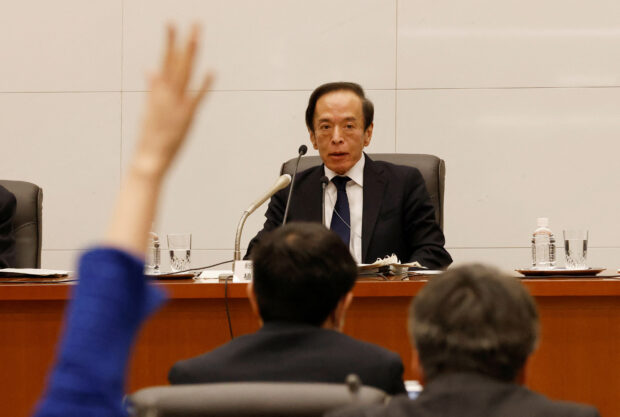Japan’s upbeat wages may keep new BOJ chief on hook for policy tweak

A reporter raises her hand to ask questions to Bank of Japan Governor Kazuo Ueda at a news conference at the bank headquarters in Tokyo, Japan, April 10, 2023. REUTERS/Kim Kyung-Hoon/Pool
TOKYO – Japan’s new central bank governor Kazuo Ueda says he is in no rush to shift away from the radical monetary stimulus of his predecessor, but wage pressures may force him to make the policy tweaks faster than he’d like.
Ueda, who commenced his new role at the bank this week, is widely expected by markets to take Japan out of the extremely accommodative monetary settings introduced by previous governor Haruhiko Kuroda in recent years – the only question is when he might do this.
While the extremely low interest rates and complicated policy framework of the Kuroda era are deeply unpopular with the financial sector and the wider public, Ueda has to date been publicly cautious in his guidance, saying current settings remain appropriate for now.
However, a widely expected upgrade in the Bank of Japan’s price forecasts due this month may show inflation staying near 2% for several years.
Analysts say that could rekindle market expectations of a change to yield curve control (YCC), a policy that caps the 10-year bond yield around zero and has drawn criticism for distorting markets and hurting banks’ margins.
Ueda’s comments on Monday warning of the danger of being too late in normalizing policy also suggest a near-term tweak to YCC was not off the table, said Naomi Muguruma, senior market economist at Mitsubishi UFJ Morgan Stanley Securities.
“The BOJ will probably upgrade its price forecasts this month. In doing so, it could offer new guidance on future policy and tweak YCC around summer or autumn,” she said.
Managing expectation
In his confirmation hearing to parliament in February and Monday’s inaugural news conference, Ueda vowed to sustain Kuroda’s massive stimulus program including YCC, which tempered market bets of an immediate policy shift.
Having battled Japan’s debilitating deflation as BOJ board member two decades ago, Ueda stressed the need to wait until budding signs of wage growth become sustained, and help inflation stably meet the central bank’s 2 percent target.
But big wage hikes pledged by major firms this year and a rebound in private consumption heighten the chance inflation will remain elevated, analysts say, casting doubt over the BOJ’s view that sustained achievement of 2 percent inflation remains elusive.
Ueda may need to find a new reason to keep ultra-loose policy if the BOJ’s fresh quarterly forecasts, due at his debut meeting on April 27-28, show inflation hovering around 2 percent in the next three years.
The BOJ has said it was focusing more on trend inflation driven by domestic demand, and in doing so was looking closely at core-core consumer inflation – an index that strips away the effect of volatile fresh food and energy.
Under the assumption that solid economic growth will prod firms to raise wages and inflation, the BOJ currently expects core-core inflation to hit 1.8 percent in the fiscal year that began in April before slowing to 1.6 percent the following year.
With more firms hiking prices and employees’ pay, the BOJ may revise up the forecasts and see inflation stay around 2 percent through fiscal 2025, analysts say.
Even if the BOJ decides to stand pat in April, the release of more thorough wage data around mid-year, which covers smaller firms, may give policymakers reason to consider tweaking YCC.
“Wages are rising and domestic demand is firm. It’s hard to find any reason to downgrade the BOJ’s rosy scenario projecting a wage-inflation cycle kick off in coming years,” said Seisaku Kameda, a former top BOJ economist with experience drafting the central bank’s growth and inflation projections.
“The BOJ may see scope to tweak YCC as early as June,” he said. “Ueda hasn’t ruled out modifying YCC. He’s just saying any first step he takes won’t be a big leap towards an exit.”
Read Next
Subscribe to INQUIRER PLUS to get access to The Philippine Daily Inquirer & other 70+ titles, share up to 5 gadgets, listen to the news, download as early as 4am & share articles on social media. Call 896 6000.
For feedback, complaints, or inquiries, contact us.
For all the latest Business News Click Here
For the latest news and updates, follow us on Google News.



